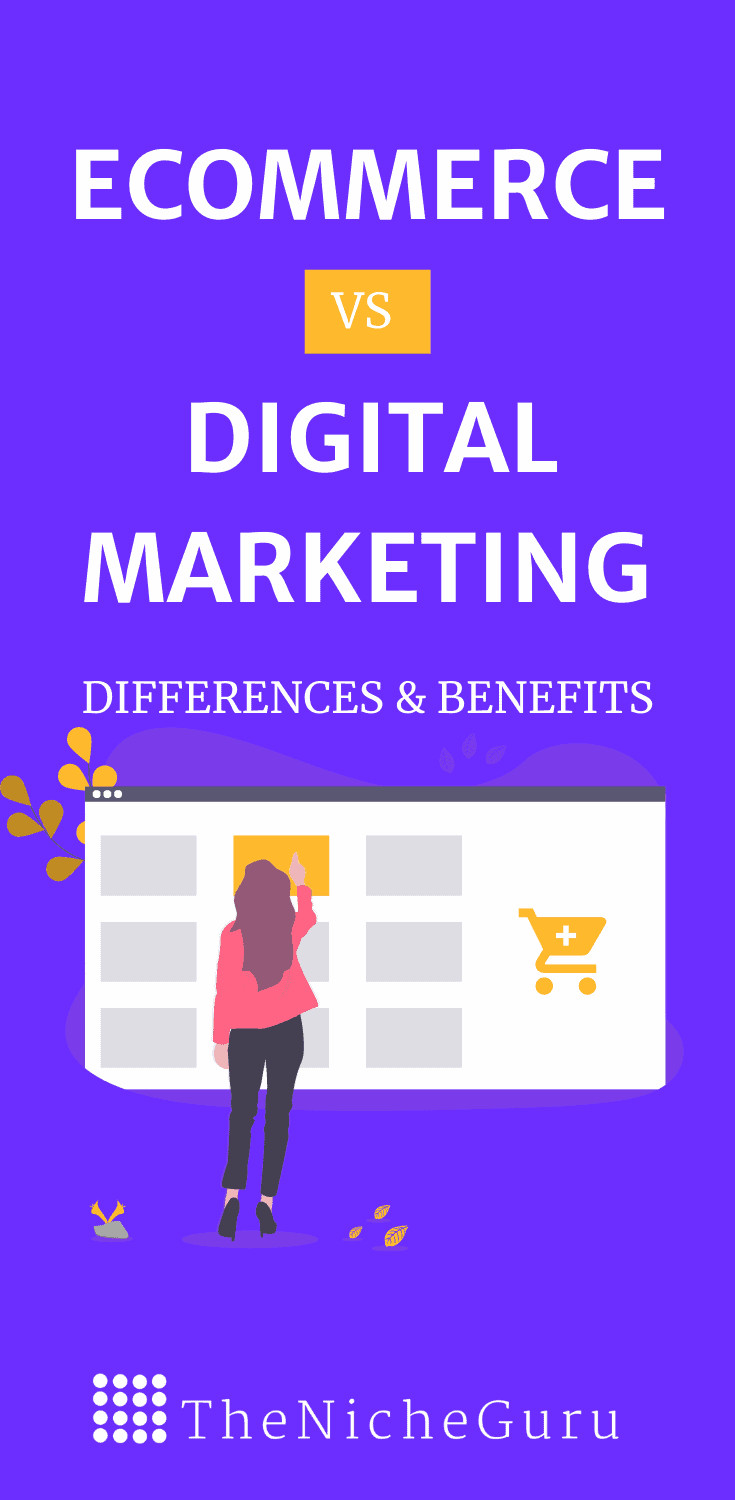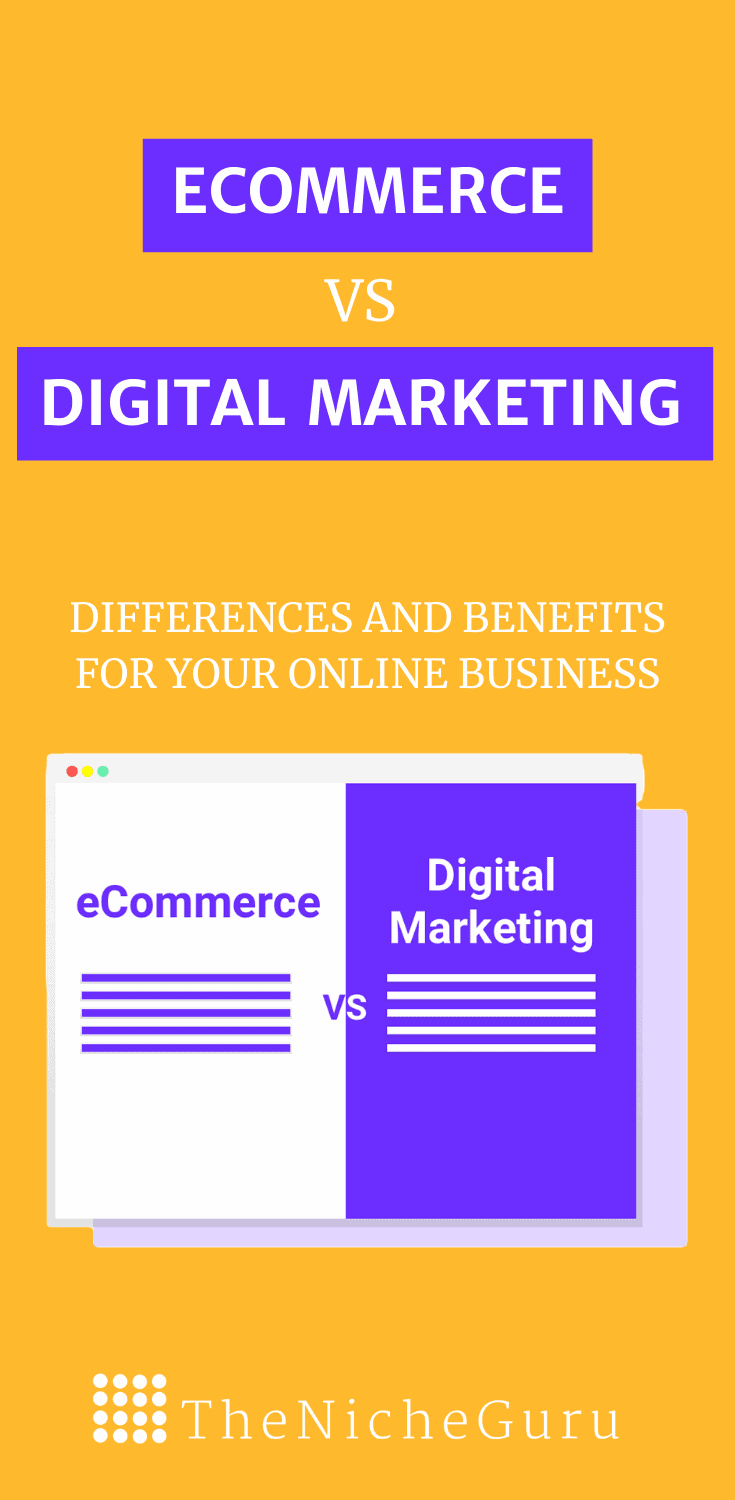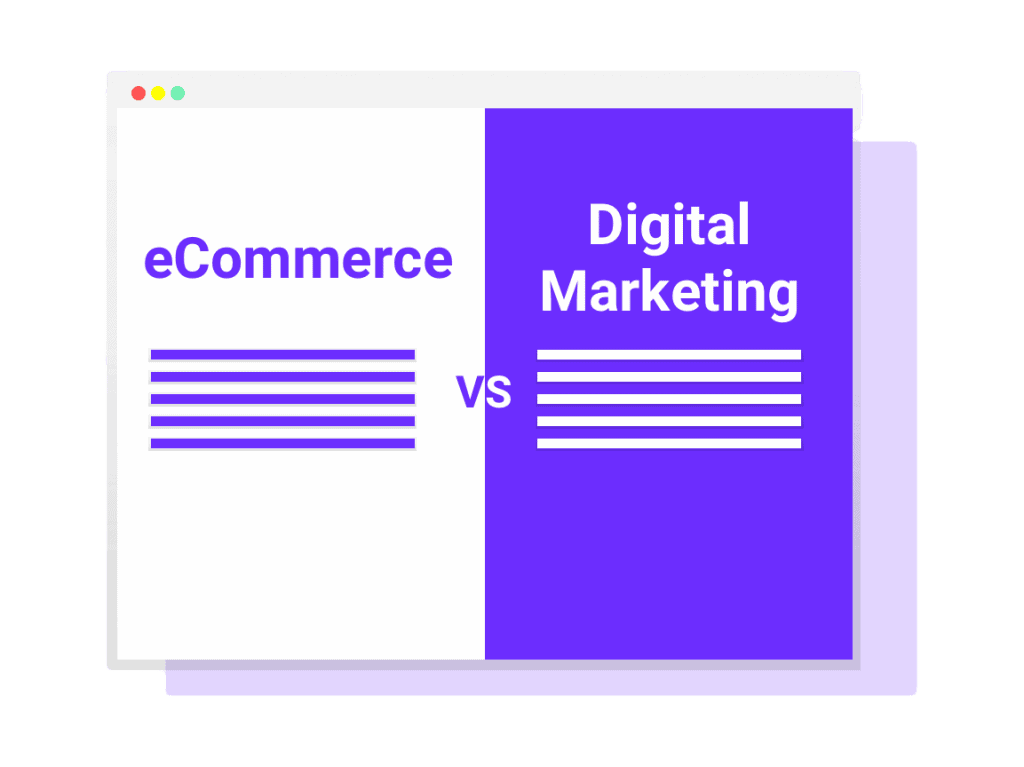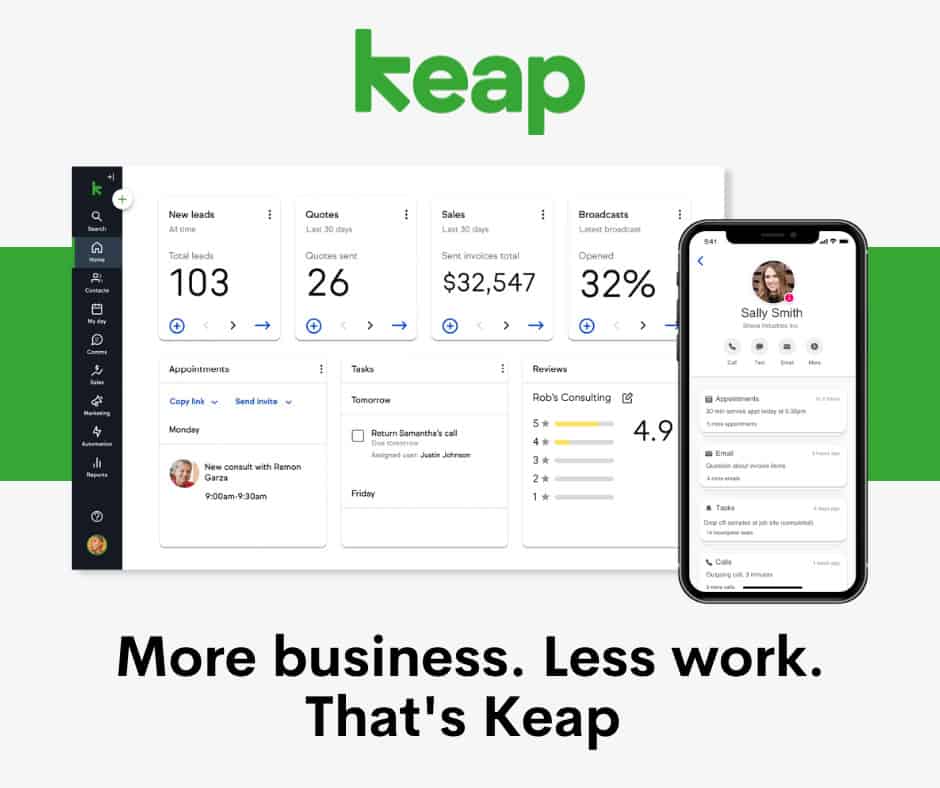Are you curious about the key differences between eCommerce and digital marketing, and how they benefit your business?
This question is becoming increasingly relevant as the digital landscape evolves. There’s a lot of confusion out there, with some misconceptions suggesting a rivalry between eCommerce and digital marketing. In reality, they’re not competitors; they’re powerful allies.
Think of eCommerce digital marketing as a toolbox filled with strategies and techniques for promoting and selling your products or services online. It’s a blend of search engine optimization (SEO), pay-per-click (PPC) advertising, content marketing, email marketing, social media marketing, and more. This fusion allows businesses to effectively target and engage their audience, drive traffic to their online stores, and boost sales conversions. It’s this synergy of eCommerce with digital marketing that empowers businesses to stand out and succeed in today’s competitive online world.
In this post, I’ll unravel the differences and benefits of each, and how you can harness their combined power. Stay tuned to dive deeper into this topic!
- What is e-commerce?
- Benefits of e-commerce.
- Types of e-commerce.
- Examples of eCommerce sites.
- What is digital marketing?
- Benefits of digital marketing.
- Examples of digital marketing.
- Digital Marketing and Ecommerce- Are they the same?
- What’s the difference between Digital marketing vs e-commerce?
- Why the confusion between e-commerce vs digital marketing.
- The combination: ecommerce digital marketing.
- Best tools for e-commerce and digital marketing.
- Ecommerce vs Digital marketing- Conclusion.
*Disclosure: I only recommend products I would use myself, and all opinions expressed here are my own. This post may contain affiliate links that at no additional cost to you, I may earn a small commission.
What is e-commerce?

Ecommerce refers to buying and selling goods or services using the internet and transferring money and data to execute these transactions. It is also known as electronic commerce or internet commerce.
Ecommerce is often used to refer to the sale of products or services online, but it can also describe any commercial transaction facilitated through the internet.
Do not mistake with ebusiness. Whereas e-business refers to all aspects of operating an online business, eCommerce refers specifically to the transaction of goods and services.
E-commerce marketing is a subset of digital marketing that focuses specifically on driving awareness and traffic to an online store or e-commerce platform and converting that traffic into sales and repeat customers. It involves various digital marketing strategies and tools tailored to the unique needs and goals of e-commerce businesses.
Benefits of e-commerce.
Many people have realized that the online marketplace is a great platform for creating or expanding your business. That is why many entrepreneurs invest their time, money, and efforts into building profitable niche websites that allow them to sell goods or services online.
Now, let’s see some of the benefits of e-commerce:
- Global Reach: Ecommerce enables businesses to expand their market beyond local boundaries, reaching customers worldwide.
- Reduced Costs: Lower operational costs compared to traditional retail, as there’s no need for a physical storefront and associated expenses.
- Convenience for Customers: Offers 24/7 shopping convenience, allowing customers to shop anytime, anywhere.
- Personalized Shopping Experience: Ability to offer personalized recommendations and deals based on customer data and shopping behavior.
- Easy Access to Customer Data: Facilitates the collection and analysis of customer data for better marketing strategies and product development.
- Scalability: Easier to scale business operations and inventory to meet customer demand without the constraints of physical space.
- Niche Market Reach: Allows businesses to reach specific niche markets that might be difficult to access through traditional retail channels.
- Direct Communication with Customers: Easier direct communication with customers through email, social media, and other digital channels.
- Increased Sales Opportunities: Integration of advanced technologies like AI and VR can enhance the shopping experience, leading to higher sales.
- Environmentally Friendly: Potential to be more environmentally friendly with less need for physical materials and reduced carbon footprint from customer travel.
Types of e-commerce.
- Retail: The sale of products directly to a consumer without an intermediary. This has been a trendy e-commerce business in the 21 century. Check my post about retail arbitrage on Amazon to learn more.
- Dropshipping: The sale of products that are manufactured and shipped to consumers via a third party. This is without a doubt increasing in popularity. I suggest you check the best dropshipping niches.
- Digital products: Downloadable items like templates, courses, e-books, software, or media that can be bought online. Whether it’s the purchase of software, tools, cloud-based products, or digital assets, these represent a large percentage of e-commerce transactions. You can check how to create a digital product here.
- Wholesale: Products sold in bulk. Wholesale products are usually sold to a retailer, who then sells the products to consumers. This e-commerce business model is now less frequent than it used to be.
- Services: These are skills like coaching, writing, influencer marketing, etc., that are purchased and paid for online. Drop servicing would be an example of an eCommerce Service.
- Subscription: A popular D2C model, subscription services are the recurring purchases of products or services regularly. I suggest you check Subbly if you want to build a website based on the commerce subscription model. This service is for inexperienced users who need a ready to go commerce site based on subscriptions.
Examples of eCommerce sites.
- Amazon.com. Amazon is probably one of the best examples of a thriving eCommerce business. It is currently the largest e-commerce retailer in the United States.
- Alibaba: The Chinese company Alibaba is by far the world’s most successful e-commerce company and retailer, hosting the largest B2B (Alibaba.com), C2C (Taobao.com), and B2C (Tmall) marketplaces across the globe.
- Walmart: Once the top retailer in the US, Walmart has focused mightily upon their online business, with great results, offering traditional retail sales, as well as grocery delivery and subscription services.
- eBay: One of the first e-commerce sites, eBay still dominates the digital market space, allowing businesses and individuals to sell their products online and buy by bidding on second-hand items.
You might Want to read next:
What is digital marketing?
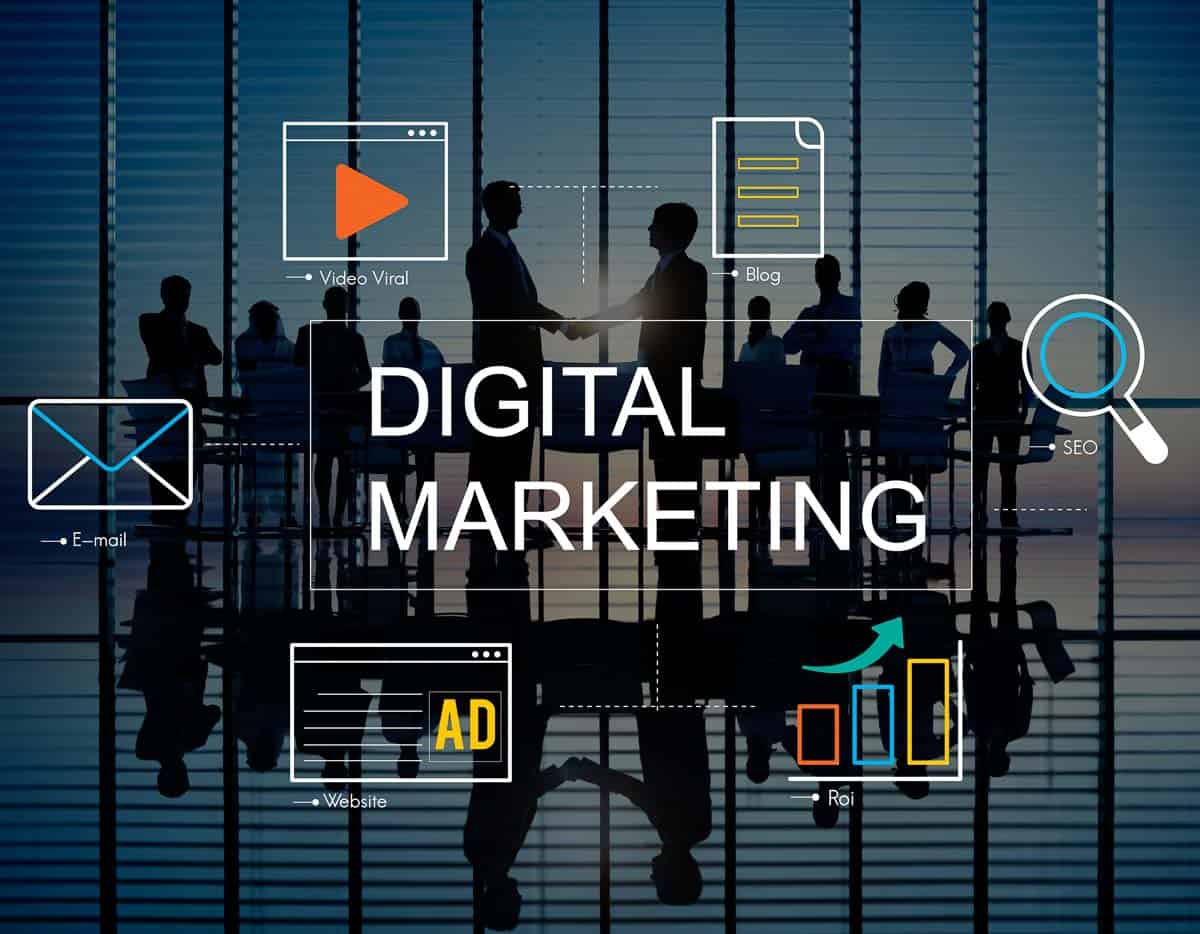
Digital marketing is the marketing component that uses the internet and online-based digital technologies to promote products and services.
It is basically the use of different digital channels to promote products or services. You can do this by using social media, email marketing, Google search, Google Ads, blogs, or websites to attract potential customers.
Benefits of digital marketing.
- Targeted Audience Reach: Digital marketing allows precise targeting of specific demographics, interests, and behaviors, ensuring that marketing efforts reach the most relevant audience.
- Cost-Effective: Generally more cost-effective than traditional marketing methods, offering a better return on investment, especially beneficial for small businesses and startups.
- Measurable Results: Provides real-time data and analytics, making it easier to measure the effectiveness of campaigns and adjust strategies accordingly.
- Increased Engagement: Facilitates interactive and engaging marketing through various formats like videos, blogs, and social media, enhancing customer engagement.
- Global Reach: Offers the ability to market and reach audiences globally, breaking geographical barriers.
- 24/7 Marketing: Digital platforms enable round-the-clock marketing, allowing campaigns to run and reach audiences at any time.
- Content Personalization: Enables the personalization of content and marketing messages based on user preferences and behavior, increasing relevance and effectiveness.
- Building Brand Awareness and Reputation: Helps in building brand awareness and reputation through consistent engagement and quality content.
- Adaptability to Trends and Insights: Allows for quick adaptation to market trends, customer feedback, and technological advancements.
- Mobile Accessibility: Reaches audiences on mobile devices, catering to the growing number of users who access the internet primarily through smartphones.
- Increased Conversion Rates: Digital marketing strategies, especially inbound tactics, have higher conversion rates, turning leads into customers more effectively.
Examples of digital marketing.
- Social media marketing. Social platforms allow you to connect with your audience, improve your brand, increase leads, and get sales.
- Email marketing. It is based on the massive sending of emails to a contact list, giving you the possibility of having a more direct connection with your potential clients and generating a high conversion rate. Personally, I think email marketing is the key to any business’s success.
- Search engine optimization (SEO). It allows you to position your website on the first page of Google results and, in this way, get more organic visits. You can check my guide to niche keyword research to learn how to do it yourself.
- Search Engine Marketing (SEM). It consists of placing paid ads within search engines, and unlike SEO, the results are immediate.
- Affiliate marketing. Promoting other companies’ products and services on your platform. The pay you receive is proportional to the traffic you send the receiver’s way. It works if your website is performing well. You can learn how to make money with affiliate marketing without a website here.
You might want to read next:
Digital Marketing and Ecommerce- Are they the same?
Digital marketing and e-commerce might sound the same to you, but are they?
Digital marketing is using digital technologies to market a product or service. Digital technologies include mobile phones, social media, online marketing, and display advertising. On the other hand, online marketing refers to marketing that takes place online.
So although they might seem similar, they are not.
What’s the difference between Digital marketing vs e-commerce?
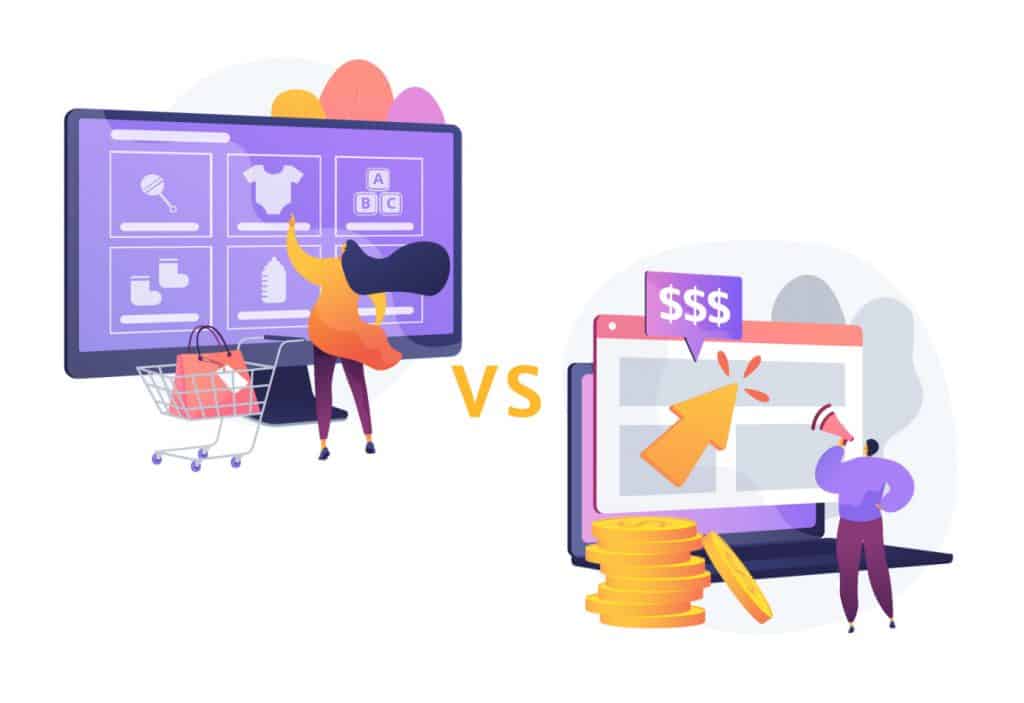
So what is the difference between digital marketing vs ecommerce? Although they are different, they work hand in hand. They are complementary processes.
But let me explain it best with a distinction of both by defining scopes and objectives for each:
- Digital Marketing:
- Definition: Digital marketing refers to the use of digital channels, tools, and strategies to promote a brand, product, or service on the internet. It encompasses a wide range of marketing activities conducted online.
- Scope: Includes SEO (Search Engine Optimization), social media marketing, email marketing, content marketing, PPC (Pay-Per-Click) advertising, affiliate marketing, and more.
- Objective: The primary goal is to reach potential customers through various digital platforms, create brand awareness, engage with the audience, and ultimately drive conversions, which could be sales, sign-ups, downloads, etc.
- Applicability: Digital marketing is not limited to e-commerce businesses; it’s utilized by a wide array of industries, including services, education, entertainment, and non-profits.
- E-Commerce:
- Definition: E-commerce, short for electronic commerce, refers specifically to the buying and selling of goods and services over the internet. It involves online transactions and the management of online sales.
- Scope: Encompasses the entire process of operating an online store or marketplace, including product listing, inventory management, order processing, shipping, and customer service.
- Objective: The primary goal is to facilitate commercial transactions online. E-commerce businesses focus on converting website visitors into paying customers and processing these transactions smoothly.
- Applicability: E-commerce is a business model adopted by online retailers and marketplaces. It can be a part of a larger business strategy that includes physical stores (brick-and-mortar) or be purely online.
In summary, digital marketing is a set of techniques used to promote products or services online, which can include e-commerce businesses among many others. E-commerce, on the other hand, is specifically about conducting commercial transactions online. Digital marketing strategies are often employed to drive traffic and sales to e-commerce websites.
Why the confusion between e-commerce vs digital marketing.
The confusion of people comparing e-commerce vs digital marketing comes from the fact that they share similar tools. However, these tools are used with different ends.
For instance, let’s say you use email as a tool. You could send emails to your subscribers to get them to visit a new post where they can buy products from your e-commerce website. In this case, you are using email as a digital marketing tool to attract your customers.
Now, let’s say you send out an email, and your clients can directly purchase through your email. That would be an example of eCommerce.
The combination: ecommerce digital marketing.
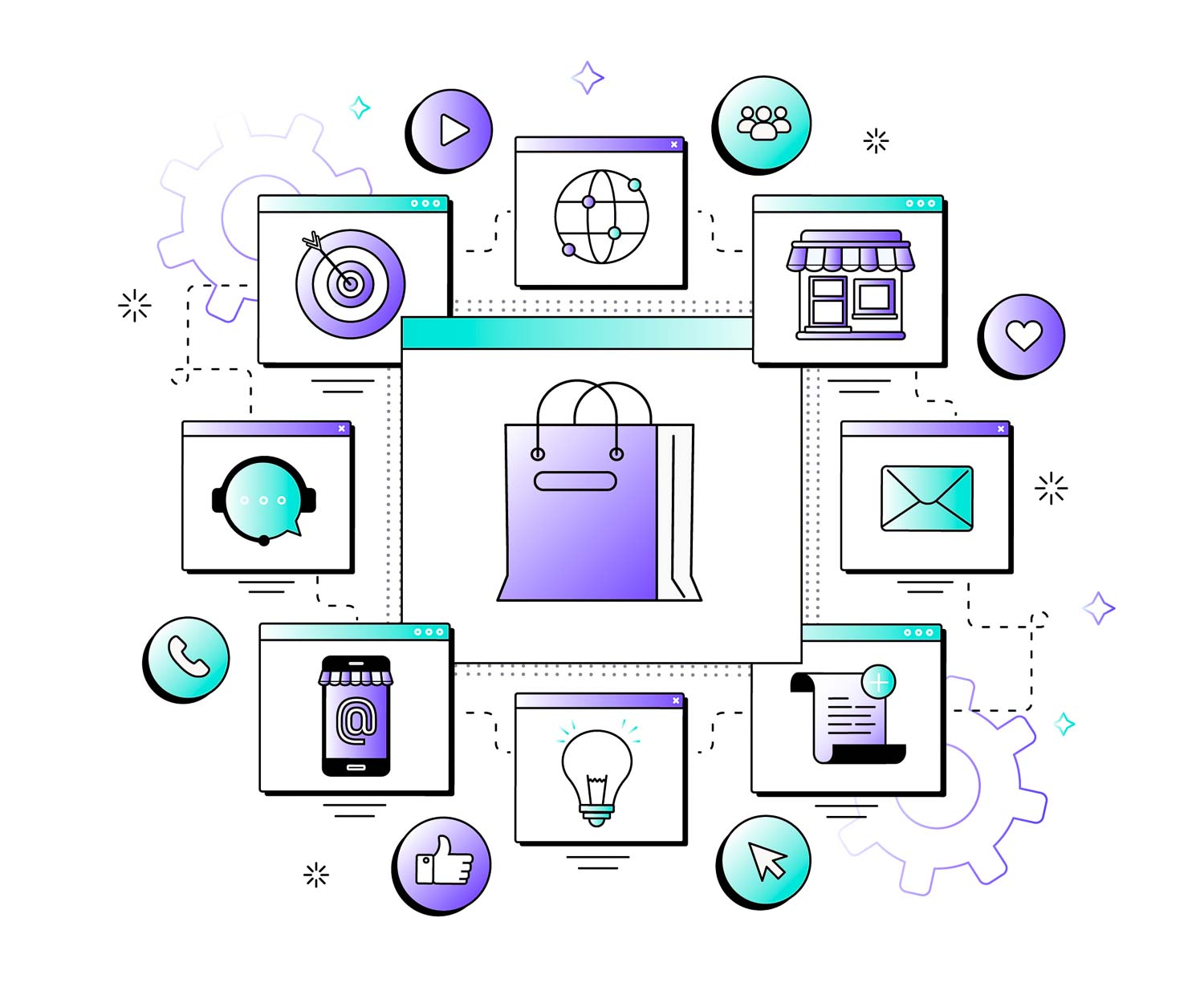
So what happens when you combine both? Then you get Ecommerce digital marketing!
E-commerce digital marketing refers to the strategies and techniques used to promote and sell products or services online through electronic commerce platforms. It encompasses various marketing activities aimed at driving traffic, increasing conversions, and generating revenue for an online store.
Here are some key components of e-commerce digital marketing:
- Search Engine Optimization (SEO): Optimizing the website and product pages to rank higher in search engine results, thereby increasing organic visibility and attracting relevant traffic.
- Pay-Per-Click Advertising (PPC): Running paid advertising campaigns, such as Google Ads or social media ads, to target specific keywords, demographics, or interests and drive traffic to the online store.
- Content Marketing: Creating and distributing valuable, informative, and engaging content (such as blog posts, videos, infographics) to attract and engage potential customers, build brand awareness, and establish thought leadership.
- Email Marketing: Building an email list of customers and prospects and sending targeted promotional emails, newsletters, and personalized offers to nurture relationships, drive sales, and encourage repeat purchases.
- Social Media Marketing: Leveraging social media platforms (e.g., Facebook, Instagram, Twitter) to engage with the target audience, share product updates, run promotions, and drive traffic to the ecommerce store.
- Influencer Marketing: Collaborating with influential individuals or social media personalities to promote products, generate brand awareness, and reach a wider audience.
- Conversion Rate Optimization (CRO): Analyzing user behavior, conducting A/B testing, and optimizing the website’s design, layout, and user experience to improve conversion rates and maximize sales.
- Retargeting and Remarketing: Targeting ads to users who have previously visited the online store or shown interest in specific products, thereby reminding them of the brand and encouraging them to complete a purchase.
- Affiliate Marketing: Partnering with affiliates who promote the products or services in exchange for a commission on each sale they generate.
- Analytics and Data Analysis: Monitoring key performance metrics, analyzing customer behavior, and using data-driven insights to refine marketing strategies, identify opportunities, and optimize the ecommerce store’s performance.
Ecommerce marketing aims to increase brand visibility, drive targeted traffic, engage customers, and ultimately boost online sales and revenue. It requires a comprehensive approach that combines various channels and tactics to create a cohesive and effective marketing strategy for an ecommerce business.
Best tools for e-commerce and digital marketing.

The good news is that you don’t need many tools to run a successful e-commerce site and conduct effective digital marketing campaigns.
These are my personal favorite tools that will make a difference without breaking the bank:
- SE Ranking. This is the most affordable SEO tool you will ever find. It works great and will help you find keywords with low competition to drive traffic, which is the first step toward building a successful website. Without traffic, you’ll struggle to make sales on your eCommerce store, so this is a must.
- Keap. This should be your preference if you have to choose just one tool to combine your e-commerce with your digital marketing efforts. It can help you from capturing and convert leads to increase your passive income with all-in-one sales and marketing automation software. I really recommend this for people with less experience who wants to automatize the selling process.
- Publer. There is no more effective tool for your social media management. With this tool, you will be able to automatize your digital marketing strategy effortlessly. It will allow you to plan all your social media campaigns and post them automatically for you at the best time.
- Shopify. The most known e-commerce platform. Great to help you sell and integrate payment options straightforwardly. It is probably the easiest and fastest method to create a one-click eCommerce store.
- Active Campaign. If there is a service recognized as the top AI marketing for eCommerce, that is Active Campaign. It offers you all the tools you need to create sales funnels, sell products directly from your emails and track your sales and conversions easily. They have a free trial, so I suggest you give it a try.
- Payoneer. Payoneer is the best online bank platform for entrepreneurs. It is easy to use to start accepting money for your sales from day one. This platform is trusted and secure and works especially well if you need to handle different currencies. And what is best, registration is absolutely free.
you might want to read next:
Ecommerce vs Digital marketing- Conclusion.
E-commerce and digital marketing are related processes. Usually, E-commerce starts where digital marketing ends.
I hope this post has cleared your mind and that now you understand these terminologies much better.
If you want to start an e-commerce website, I suggest you go micro-niche. Only this way will you remove competence and increase your chances of succeeding. You can find my detailed guide on how to start a micro niche website here.
Now is your turn!
Did you understand the differences between e-commerce and digital marketing?
Leave a comment below with your answer.
